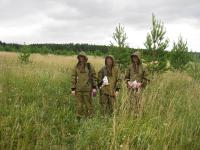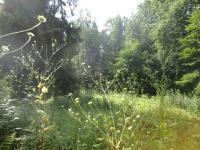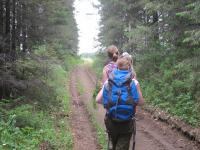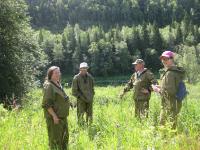Description of Internships
• Lab practice
Assessment of Rhodococcus resistance to organic solvents using a combined confocal laser scanning and atomic force microscopy (CLSM/AFM)
The project is related to the bacterial morphology and physiology. Actinobacteria of the genus Rhodococcus are naturally present in diverse pristine and contaminated environments. They can persist and grow in highly contaminated soils and waters, and even under extreme conditions. Rhodococci are of increasing interest for many environmental and biotechnological applications. Using newly established combined confocal laser scanning and atomic force microscopy (CLSM/AFM) techniques, a viability of Rhodococcus bacteria under the organic solvent stress willbe assessed at the single cell level. High resolution integrated CLSM/AFM images will be taken, which could reveal morphological changes of Rhodococcus cells in response to organic solvents, including changes in size, surface/volume ratio and surface roughness, as possible resistance mechanisms. The project results will help to better understanding the resistance mechanisms in organic solvent tolerant bacteria with high industrial potential.
• Field practice
Biodiversity and Ecology in the Urals
Internship programme for biology students includes fieldwork practice in such research areas as biodiversity and ecology of inferior and superior plants, biodiversity and ecology of invertebrate and vertebrate animals, soil studies at the PSU research center “Preduralie”. There will be organized the following expeditions: “Flora main types of Perm region and the Fore-Urals” at the nature reserve area “Basegi”; “Fungi in woodland: its taxonomy, morphology, ecology” at the nature reserve area “Upper Kvazhva”; “Water birds of Perm region”, “Soil Diversity of the Urals”.
Assessment of Rhodococcus resistance to organic solvents using a combined confocal laser scanning and atomic force microscopy (CLSM/AFM)
The project is related to the bacterial morphology and physiology. Actinobacteria of the genus Rhodococcus are naturally present in diverse pristine and contaminated environments. They can persist and grow in highly contaminated soils and waters, and even under extreme conditions. Rhodococci are of increasing interest for many environmental and biotechnological applications. Using newly established combined confocal laser scanning and atomic force microscopy (CLSM/AFM) techniques, a viability of Rhodococcus bacteria under the organic solvent stress willbe assessed at the single cell level. High resolution integrated CLSM/AFM images will be taken, which could reveal morphological changes of Rhodococcus cells in response to organic solvents, including changes in size, surface/volume ratio and surface roughness, as possible resistance mechanisms. The project results will help to better understanding the resistance mechanisms in organic solvent tolerant bacteria with high industrial potential.
• Field practice
Biodiversity and Ecology in the Urals
Internship programme for biology students includes fieldwork practice in such research areas as biodiversity and ecology of inferior and superior plants, biodiversity and ecology of invertebrate and vertebrate animals, soil studies at the PSU research center “Preduralie”. There will be organized the following expeditions: “Flora main types of Perm region and the Fore-Urals” at the nature reserve area “Basegi”; “Fungi in woodland: its taxonomy, morphology, ecology” at the nature reserve area “Upper Kvazhva”; “Water birds of Perm region”, “Soil Diversity of the Urals”.
© 1916-2018 Perm State University, Russia







